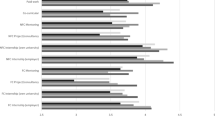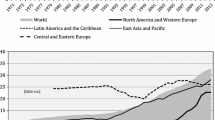Abstract
The paper takes into discussion the issue of quality of higher education services, from the perspective of graduates and employers as main beneficiaries of higher education services, by putting face to face expectations of students at graduation with employers’ requirements. In the two surveys conducted in 2006 in Romania, both graduates and employers have been asked about skills and abilities developed through higher education programmes and the extent to which these correspond to their expectations and requirements. The discussion is relevant to the vast literature presenting the skills debate, employment and graduates transition to the labour market, as well as to the literature presenting students’ expectations from higher education.
Similar content being viewed by others
References
Abbott-Chapman, J. (2003, November). Employer expectations and satisfaction with University of Tasmania graduates 2003. Final Report presented to Professor Sue Johnston, Pro-Vice-Chancellor, Teaching and Learning meeting. Retrieved November 14, 2008, from https://doi.org/www.acserv.admin.utas.edu.au.
Allen, J., Boezerooy, P., de Weert, E., & van der Velden, R. (2000). Higher education and graduate employment in the Netherlands. European Journal of Education, 35(2), 211–219.
Allen, J., & van der Velden, R. (Eds.). (2007). The flexible professional in the knowledge society: General rules of the REFLEX project. Maastricht, The Netherlands: Research Centre for Education and the Labour Market, Maastricht University. Retrieved November 14, 2008, from https://doi.org/www.reflexproject.org.
Arnesen, C. (2000). Higher education and graduate employment in Norway. European Journal of Education, 35(2), 221–228.
Arthur, L. (2006). Higher education and the area of work: Issues, challenges and responses in Norway and Germany (REFLEX Working Paper 3). Research in Comparative and International Education, 3(1). Retrieved November 14, 2008, from https://doi.org/www.wwords.co.uk.
Chadha, D. (2006). A curriculum model for transferable skills development. Journal of the Higher Education Academy Engineering Subject Centre, 1(1). Retrieved November 14, 2008, from https://doi.org/www.www/engsc.ac.uk.
Davies, H. A., Csete, J., & Poon, L. K. (1999). Employer’s expectations of the performance of construction graduates. International Journal of Engineering Education, 15(2), 191–198.
Harvey, L., Moon, S., & Geall, V. (1997). Graduates’ work: Organisational change and student attributes, UCE Birmingham. Retrieved November 14, 2008, from https://doi.org/www.www0.uce.ac.uk.
James, R. (2001, September 24). Students’ changing expectations of higher education and the consequences of mismatches with reality. Paper for OECD-MHE conference Management Responses to Changing Student Expectations, OUT. Retrieved November 14, 2008, from https://doi.org/www.cshe.unimelb.edu.au.
Jerzy, C. (2000, August 14–16). Student and employer expectation. International Conference on Engineering Education, Taiwan, Conference Proceedings. Retrieved November 14, 2008, from https://doi.org/www.ineer.org.
Johnston, B., & Elton, L. (2005). German and UK higher education and graduate employment: The interface between systemic tradition and graduate views. Comparative Education, 41(3), 351–373.
Kehm, B. (1997, July 14–25). Relationship between higher education and the labour market and the European mobility programmes. Summer course in Higher Education Policy and Institutional Decision Making, Budapest, Central European University.
Kellerman, P., & Sagmeister, G. (2000). Higher education and graduate employment in Austria. European Journal of Education, 35(2), 157–164.
Kivinen, O., Nurmi, J., & Salminitty, R. (2000). Higher education and graduate employment in Finland. European Journal of Education, 35(2), 164–177.
Kivinen, O., & Silvennoinen, H. (2002). Changing relations between education and work: On the mechanisms and outcomes of the educational system. International Journal of Life Learning Education, 21(1), 44–54.
Lee, C. (2007). The theory vs. practice balance at universities. In I. Morley (Ed.), The value of knowledge (pp. 113–124). Inter-Disciplinary Press.
Little, B. (2007, March 22). Labour market issues and international employability, Employability seminar, Sheffield Hallam University. Retrieved November 14, 2008, from https://doi.org/www.enhancingemployability.org.uk.
Maharasoa, M., & Hay, D. (2001). Higher education and graduate employment in South Africa. Quality in Higher Education, 7(2), 139–147.
Marshall, J. (2008, July 13). Europe: Preparing graduates for the work place. University World News. Retrieved November 14, 2008, from https://doi.org/www.universityworldnews.com.
Mora, J. G., Garcia-Montalvo, J., & Garcia-Aracil, A. (2000). Higher education and graduate employment in Spain. European Journal of Education, 35(2), 229–237.
Moscati, R., & Rostan, M. (2000). Higher education and graduate employment in Italy. European Journal of Education, 35(2), 201–209.
Nicolescu, L. (2002). Contribution of higher education to the transition towards the market economy: The case of Romania. In K. Liuhto & J. Jumpponen (Ed.), Ten years from transition (pp. 253–280).
Nicolescu, L. (2003). Higher education in Romania—Evolution and views from the business community. Tertiary Education and Management, 9, 77–95.
Nicolescu, L. (2007). Evaluarea Eficienței Învaǎțǎmântului în Academia de Studii Economice din Bucure[scedil ] ti in Romanian (The evaluation of the educational efficiency at the academy of economic studies). Editura ASE, Bucharest: Romania.
Paul, J. J., & Murdoch, J. (2000). Higher education and graduate employment in France. European Journal of Education, 35(2), 79–187.
Raposo, M. L. B., & Alves, H. B. (2005). Marketing higher education: Students’ services expectations. Retrieved November 14, 2008, from http://129.3.20.41/eps/hew/papers/0511/0511005.pdf.
Saunders, M., & Machell, J. (2000). Understanding emerging trends in higher education curricula and work connections. Higher Education Policy, 13, 287–302.
Săpătoru, D., Caplanova, A., & Slantcheva, S. (2002). Estimating the value of public and private higher education in Central and Eastern Europe: Labour market outcomes and institutional forms in Bulgaria, Romania and Slovakia (Report to PHARE—ACE P98-1020-R project).
Schomburg, H. (2000). Higher education and graduate employment in Germany. European Journal of Education, 35(2), 189–200.
Swiatek, J. (2000). Student and employer expectation. Retrieved November 14, 2008, from https://doi.org/www.pwr.wroc.pl.
Teichler, U. (1999). Research on the relationship between higher education and the world of work: Past achievements, problems and new challenges. Higher Education, 38, 169–190.
Teichler, U. (2008, January 24). “Employability” and the curriculum: The future of employment and work of university graduates and of the character of bachelor programmes, Leon. Retrieved November 14, 2008, from https://doi.org/www.web.micinn.es.
Teichler, U., & Schomburg, H. (2006). Higher education and graduate employment in Europe: Results from graduate surveys from 12 countries (Higher Education Dynamics, 15(Series)). Dordrecht: Springer.
Teichler, U., & Schomburg, H. (2007, February 12–13). Neither overeducation nor mismatch—Recent trends for higher education graduates. Presentation at the OECD Expert Meeting ‘How might the changing labour market transform higher education’, Paris. Retrieved November 14, 2008, from https://doi.org/www.oecd.org.
Tricker, T. (2005). Student expectations—How do we measure up. In F. McMahon & T. Claes (Eds.), Probing the boundaries of higher education (pp. 111–114). Inter-Disciplinary Press.
Woodley, A., & Brennan, J. (2000). Higher education and graduate employment in the United Kingdom. European Journal of Education, 35(2), 239–249.
Zaharia, R. (2007). Cercetarea opiniilor angajatorilor despre performantele absolventilor ASE in Romanian [Researching the opinion of employers about performances of ASE graduates]. In L. Nicolescu (Ed.), Evaluarea Eficien]ldecit[ ei Învaǎțǎmântului în Academia de Studii Economice din Bucure]c[esdli ti [The evaluation of the educational efficiency at the academy of economic studies] (pp. 164–173). Editura ASE, Bucharest: Romania. (In Romanian)
Author information
Authors and Affiliations
Corresponding author
Rights and permissions
About this article
Cite this article
Nicolescu, L., Pǎun, C. Relating Higher Education with the Labour Market: Graduates’ expectations and employers’ requirements. Tert Educ Manag 15, 17–33 (2009). https://doi.org/10.1080/13583880802700024
Published:
Issue Date:
DOI: https://doi.org/10.1080/13583880802700024




